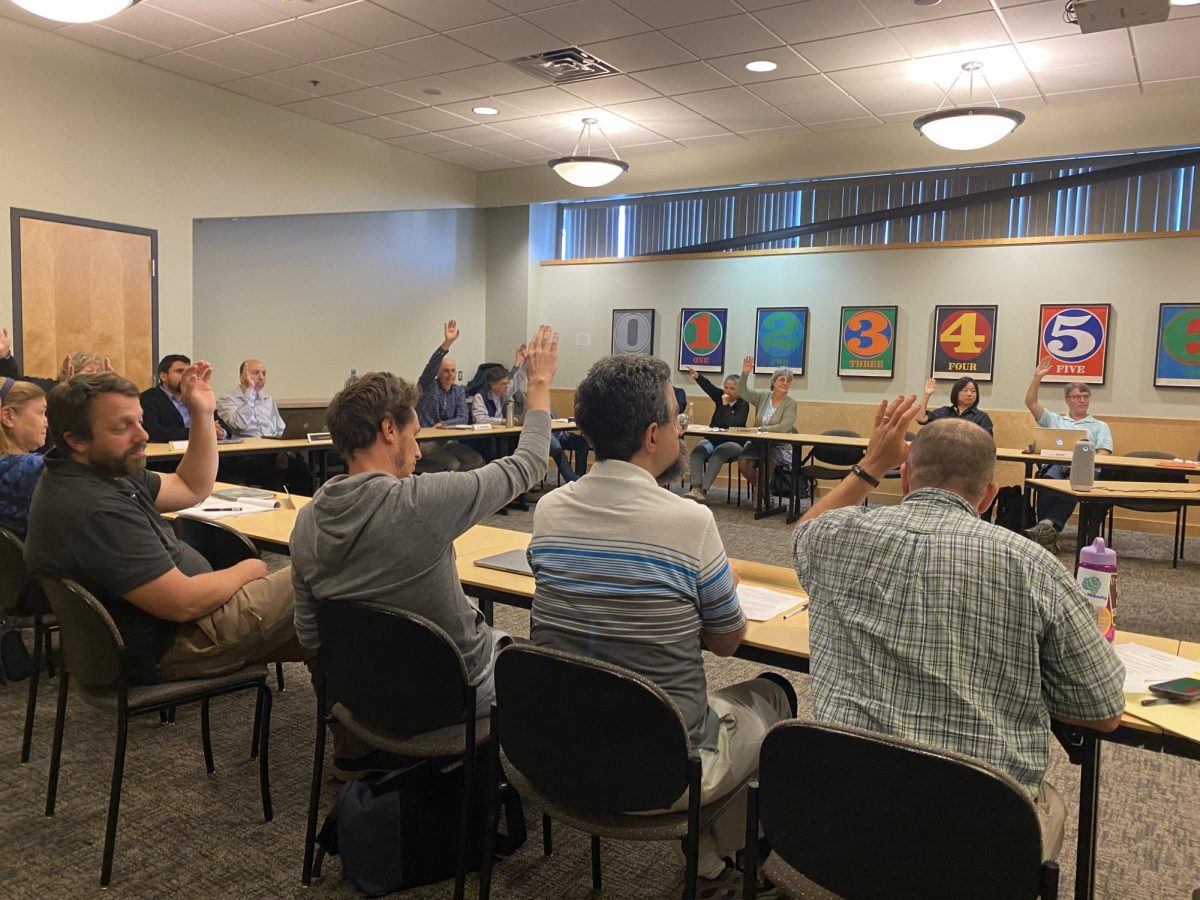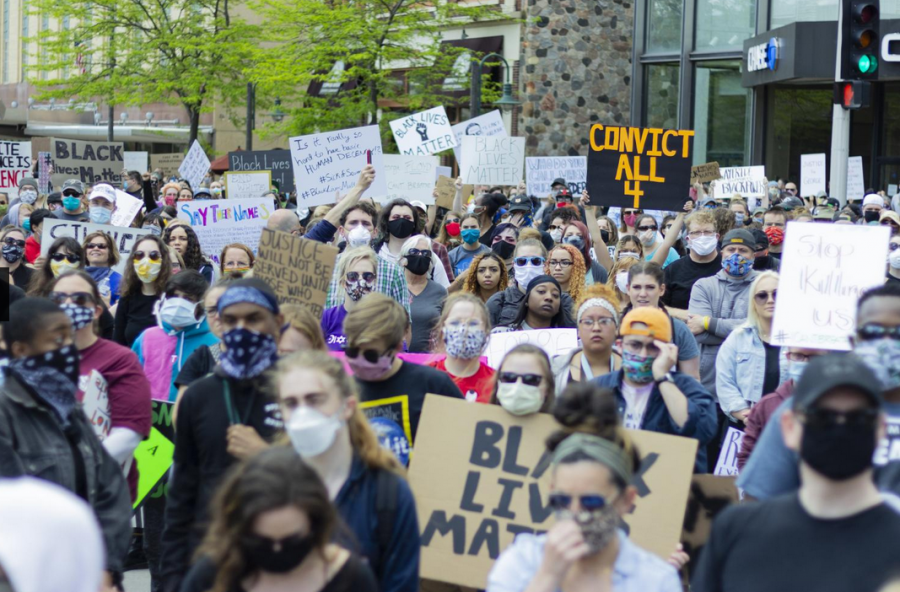UW Oshkosh staff and faculty members have circulated a letter addressed to Faculty Senate President Pascale Manning for the past two weeks, asking the senate to draft a referendum of a no-confidence vote of Chancellor Andrew Leavitt’s leadership.
The petition featured nine main reasons why members of the faculty lack confidence in Leavitt’s ability to effectively lead UWO and want to schedule a faculty referendum regarding his job performance.
The nine points in the petition include Leavitt’s involvement in “substantial overspending of revenues” that led to the current budget deficit and staff layoffs; the failure to implement effective strategies to address enrollment declines; and a disregard for shared governance groups. Faculty and staff also mentioned that they were unhappy with Leavitt using a consulting firm, not faculty and staff, to determine layoffs.
A referendum of a vote of no confidence by the faculty senate would be largely symbolic since the UW Board of Regents is the only group with the authority to fire a Universities of Wisconsin chancellor.
While this vote does not directly have the power to remove Leavitt from his position, the Faculty Senate needs to draft a referendum that proposes a vote of no confidence even if it is just symbolic. A vote of no confidence would show not just students, but also the entire Universities of Wisconsin community that changes need to be made in UWO’s leadership.
In the petition, staff and faculty at UWO said that while the university is strong, the top leadership is not.
“We are deeply invested in the success of this institution and the quality of the education we provide,” the petition said. “Our purpose is to seek a beneficial change in management practices that will result in better decisions that emphasize educational quality and positive student outcomes. We take no joy in listing the failings of our current leadership.”
Staff and faculty said in the letter to Manning that last semester, they gave the administration the opportunity to meet a set of reasonable expectations for collaboration that were unanimously endorsed in the Faculty Senate.
“A top-down, opaque management style has persisted,” the letter said. “We make better decisions together and with full information. At such a critical juncture for our institution, we feel it is important to get a sense of the views of the whole faculty on our administrative leadership.”
In a statement to the Wisconsin State Journal responding to the petition, Leavitt said that UWO is on the right path and that his focus remains on closing the university’s budget gap.
“That deficit has been driven by a perfect storm of changing demographics, adverse enrollment trends and rising costs disrupting so many higher education institutions,” Leavitt said. “We chose to face our challenge head on while shielding students’ programs and experiences as best we could. It required historically difficult decisions last year, painful to [UWO’s] people.”
If staff and faculty officially sign off on a document that questions Leavitt’s leadership ability, that tells current and future UWO students that the administration is in disarray. That could cause enrollment to fall even lower than it already has (enrollment dropped by 1.7% at the beginning of the fall 2023 semester, whereas every other UW school except UW-Madison increased enrollment by 3%). If enrollment drops even more than it has, then the university will find it a lot harder to climb itself out of the $18 million hole UWO is already in.
If the faculty did vote that they have no confidence in the Chancellor’s leadership abilities, that would lead to even more bad press for the university in the wake of the $18 million deficit and budget cuts. The vote would surely catch the eye of the Universities of Wisconsin President Jay Rothman, who could bring this to the attention of the Board of Regents to review Leavitt’s job performance. If UWO students turn against the chancellor, which many already have, there could be a compelling case that if students, faculty and staff all question his authority, then it may be time to move on to someone new.
There has never been a UWO chancellor who was fired by the Board of Regents in the 153 years the university has existed. Realistically, unless he did something illegal or made the wrong people mad, there would be a very slim chance that Leavitt would get fired. But there always is the possibility that he would resign if enough faculty, staff and students turned on him.
In 1978, UWO Chancellor Robert Birnbaum resigned after four years at the university when students, faculty and staff became highly critical of his administration. Similar to Leavitt’s last few years in charge of the University, UWO saw a declining enrollment in the mid-1970s and the UW System faced budgeting problems during a major recession. We’ve seen something very similar to this happen almost 50 years ago, so there may be a chance that history repeats itself and a UWO chancellor steps down after pressure from constituents.
All in all, it is important for the Faculty Senate to draft a referendum proposal of a no-confidence vote, even if it is largely symbolic. The only way for faculty, staff and students to see action taken against the current administration is to keep pushing for changes. Whether that be protests, letters or something else, if the people of UWO continue to push back against the leadership at the university, someone will have to budge, and it doesn’t look like the faculty and staff will be stopping the push for change anytime soon.
While a referendum for a vote of no confidence may generate somewhat of a poor reputation for UWO, it’s extremely important for staff, faculty and students to participate in civic engagement. Even Rothman spoke out last fall about the dangers of avoiding difficult conversations on campus.
“If we aren’t courageous enough to simply address these issues head-on, understanding that we need to listen and compromise, I don’t know where we end up,” Rothman said at a panel on student engagement. “We deserve better than that and we have to do better.”
It is the duty of faculty, along with staff and students, to hold the university accountable. As an academic institution, UWO needs to be held to a certain standard, and if many people feel this standard is not met, action needs to be taken.
There is expected to be more than the 10% of faculty and staff signatures necessary for the petition to make its way in front of the Faculty Senate to draft the referendum proposal of a no-confidence vote. Sources told the Advance-Titan that the senate is expected to present the draft of the referendum proposal at the next meeting on Feb. 27.











